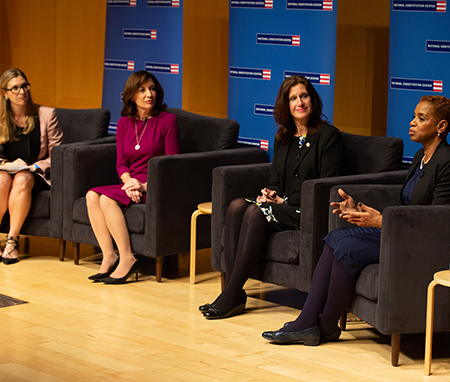New York Times bestselling author Cass Sunstein unveils his new book, How to Interpret the Constitution—a citizen’s guide to the rival approaches of originalism and living constitutionalism. Sunstein is joined by leading constitutional expert Philip Bobbitt of Columbia Law School to discuss the current controversies surrounding constitutional interpretation and provide their takes on the competing methodologies. Jeffrey Rosen, president and CEO of the National Constitution Center, moderates.
Video
Podcast
Participants
Philip Bobbitt is the Herbert Wechsler Professor of Federal Jurisprudence at Columbia Law School. He is the author of 10 books, including Constitutional Fate; Constitutional Interpretation; and his most recent work is a new edition of the authoritative Impeachment: A Handbook, written in 1974 by Charles Black.
Cass Sunstein is the Robert Walmsley University Professor at Harvard University and the founder and director of the Program on Behavioral Economics and Public Policy at Harvard Law School. He is the author of dozens of books, including the New York Times bestseller Nudge (with Richard H. Thaler); On Freedom; #Republic; and The World According to Star Wars. His newest book is How to Interpret the Constitution.
Jeffrey Rosen is the president and CEO of the National Constitution Center, a nonpartisan nonprofit organization devoted to educating the public about the U.S. Constitution. Rosen is also a professor of law at The George Washington University Law School and a contributing editor of The Atlantic.
Additional Resources
- Cass Sunstein, How to Interpret the Constitution
- Phillip Bobbitt, Constitutional Fate
- National Constitution Center's Constitution 101 Activity Guide: Introduction to the Methods of Constitutional Interpretation
- National Constitution Center's Constitution 101: Methodologies of Constitutional Interpretation
- McCulloch v. Maryland (1819)
- Cass Sunstein's Theories of Interpretation (PDF)
- Philip Bobbitt's Six Modalities of Constitutional Argument (PDF)
Excerpt from transcript
On prudential arguments, the legitimacy of constitutional arguments, and the Justices’ interpretations
Philip Bobbitt: Now I guess my sermon today can be summed up in one sentence. And that is that these are all legitimate forms of argument. There are forms of argument in other cultures. For example, arguments from religious texts or arguments from kinship, that are not legitimate in our system, but that all of these are. And if I have a criticism of Cass' book, it's that he doesn't mention the sixth form of argument, prudential argument, because he embodies it.
Jeffrey Rosen: Cass, your thoughts about Philip's broad appreciation for your book, his claim that your central thesis, which is that we need to engage in reflective equilibrium and choosing among the methodologies, is itself a prudential argument. And your thoughts on…and tell our friends what you mean by reflective equilibrium and whether or not you agree with Philip that these are all legitimate forms of argument and we have to choose among them based on our conclusions about correct outcomes.
Cass Sunstein: Okay, so goal number one, and thank you, Jeff, for highlighting this, is to just get clear on what people who disagree about constitutional interpretation, what their different views are. And that's, I think, not unhelpful, even if you agree with one team and don't like another team. So, the originalists, of whom Justice Thomas is one, don't agree with the traditionalists. Chief Justice Roberts is often a traditionalist, because they want to recover the original public meaning. They don't care about long-standing traditions, and that's a disagreement.
Cass Sunstein: Justice Ginsburg was, and Justice Sotomayor often is, a kind of democratic reader of the Constitution and emphatically not an originalist. They disagree with one another, and it's important to see what exactly they're disagreeing about. Justice O'Connor was a common law constitutionalist, I think, going case-by-case. She wasn't originalist, certainly not. So they have different views. And to understand the difference maybe makes us have sympathetic appreciation of people who are doing their best with very disparate starting points.
Full Transcript
View Transcript (PDF)
This transcript may not be in its final form, accuracy may vary, and it may be updated or revised in the future.
Stay Connected and Learn More
Continue the conversation on Facebook and Twitter using @ConstitutionCtr.
Sign up to receive Constitution Weekly, our email roundup of constitutional news and debate, at bit.ly/constitutionweekly.
Please subscribe to Live at the National Constitution Center and our companion podcast We the People on Apple Podcasts, Stitcher, or your favorite podcast app.








